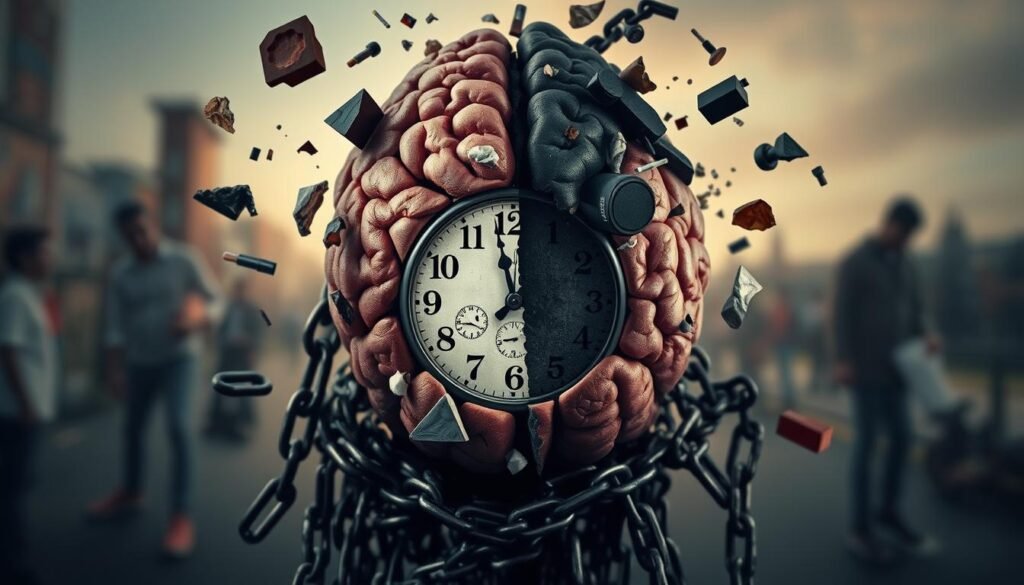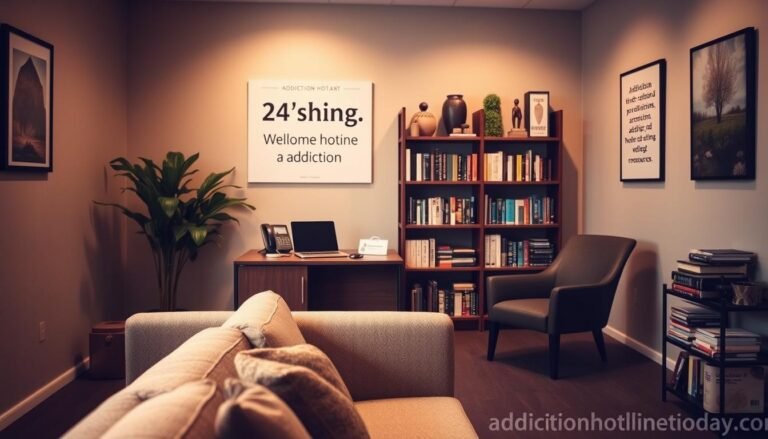Understanding Addiction: Effects on Your Daily Life
What does addiction really mean, and how can it impact your life? Addiction is a complex brain disease that affects millions in the U.S. It’s often misunderstood. It’s not a character flaw or moral failing. Instead, it’s a chronic illness needing treatment and support for recovery.
Addiction is marked by compulsive behaviors and a lack of control over substance use, despite negative consequences. The journey to addiction doesn’t happen overnight. It develops over time as the brain adapts to drugs or alcohol. This can lead to lasting changes, making recovery a lifelong challenge.
Key Takeaways
- Addiction is a chronic brain disease, not a personal weakness or character flaw.
- The path to addiction often develops gradually as the brain adapts to substance use.
- Addiction can have far-reaching effects on daily life, including physical, mental, and social consequences.
- Acknowledging the problem is the first step in the recovery process, which involves various treatment options.
- With the right support and commitment, recovery from addiction is possible for individuals of all backgrounds.
Defining Addiction: A Brain Disease Perspective
Addiction is a complex brain disease that deeply affects a person’s life. It’s not about willpower or moral failing. It’s a chronic condition where people compulsively seek and use drugs, despite the harm it causes. The brain’s reward system is hijacked by substance abuse.
The Science Behind Addictive Behaviors
Substance use triggers a dopamine release in the brain. Dopamine is linked to pleasure and reward. This feeling of euphoria makes people want to repeat the behavior, leading to addiction. Over time, the brain struggles to find pleasure in everyday things.
How Tolerance Develops Over Time
As the brain adapts to drugs, it needs more to feel the same pleasure. This is called tolerance. Users take more drugs, which can harm their health. Addiction also affects decision-making, making things worse.
The Role of Dopamine in Addiction
Dopamine is key in addiction. It makes substance use rewarding and reinforcing. Over time, the brain’s dopamine system gets out of balance. This makes it hard to enjoy natural, healthy activities. The brain’s shift towards substance use is a key sign of addiction.
“Addiction is not a choice, it’s a chronic brain disease.” – National Institute on Drug Abuse
What Addiction Means and How It Can Affect You
Addiction is a complex brain disease that affects many areas of life. It can lead to physical and mental health issues, strained relationships, and financial problems. Understanding addiction’s impact is key to seeking treatment and achieving recovery.
Physical and Mental Health Consequences
Substance abuse can harm your physical health. It can cause heart disease, liver damage, and lung problems. It can also lead to mental health issues like anxiety, depression, and psychosis.
Relationship Strain and Social Isolation
Addiction can damage personal relationships. Family, friends, and colleagues may feel neglected. The addict may withdraw, leading to social isolation.
Financial Burden and Instability
Funding an addiction can be costly. It can lead to job loss, debt, and financial instability. This affects the individual and their loved ones.
It’s important to understand addiction’s wide-ranging effects. By recognizing its impact, we can better support those affected. This helps create paths to recovery.
“Addiction is a disease, and it’s a disease that can be treated. But it takes a real strong, coordinated effort to get it done.”
– Patrick J. Kennedy
The Physical Impact of Substance Abuse
Addiction affects not just the mind but also the body. It can lead to serious health problems. It’s important to understand these effects to see the need for help and treatment.
Short-term Health Consequences
The first signs of substance abuse can be scary. You might notice changes in heart rate, blood pressure, and coordination. These changes can raise the risk of accidents and serious harm.
Long-term use can weaken your immune system. This makes you more likely to get sick or catch infections.
Long-term Medical Complications
As time goes on, addiction’s effects can get worse. Addiction health risks include heart disease, liver damage, and lung disease. Substance abuse effects can also cause respiratory problems and increase the risk of diseases like hepatitis and HIV/AIDS.
Changes in Brain Chemistry
Addiction’s effects aren’t just physical. It can change your brain’s chemistry. This can lead to mental health issues like depression, anxiety, and psychosis. These changes make recovery even harder.
It’s key to tackle addiction’s physical effects for lasting recovery. Getting medical and therapeutic help is vital. It’s a complex journey, but with the right support, you can overcome addiction.
Mental Health and Addiction Connection
Addiction and mental health issues often go together. About 50 percent of individuals with severe mental disorders also struggle with substance abuse. This means 37 percent of alcohol abusers and 53 percent of drug abusers also face serious mental illness. This connection between mental illness and drug addiction is complex and urgent.
People with mental health issues might use substances to cope, leading to addiction. On the other hand, long-term substance use can make mental health problems worse. This cycle of guilt, shame, and continued substance use can harm mental health even more. It’s key to treat both addiction and mental health at the same time for recovery.

Treating both conditions together, known as dual diagnosis, needs a complete approach. Plans that include medication, therapy, and lifestyle changes work better than treating each issue alone. This way, people can get better and stay on the right path.
“Individuals with mental health disorders may turn to substances for self-medication, leading to addiction development.”
Approaches like nutritional therapy, fitness, and family support can help those with both mental illness and substance abuse. Aftercare planning is also key for lasting success. It offers ongoing support and resources after treatment.
It’s essential to tackle the addiction mental health link for those dealing with substance abuse and mental health effects. With integrated treatment and a deep understanding of this complex relationship, we can help people recover fully and improve their overall well-being.
Impact on Personal Relationships and Social Life
Addiction can deeply affect a person’s personal and social life. It can strain family bonds, work relationships, and friendships. This can lead to feelings of isolation and more substance use.
Family Dynamics and Communication
Addiction can really mess up family life and how people talk to each other. It can cause trust issues and make promises seem broken. This can make it hard for the person with addiction and their family to get along.
Family members might feel hurt, angry, or helpless. This can lead to fights and make talking to each other even harder.
Professional Relationships
Addiction can also hurt a person’s job and career. It can cause them to miss work, do a bad job, and have trouble with coworkers. This can lead to losing a job or facing big career problems.
The money troubles and feeling alone that come with addiction make these job issues even worse.
Social Isolation and Support Networks
People with addiction often choose using substances over spending time with friends. This makes them feel more alone from their friends and family. Feeling isolated makes it harder to get help and stay sober.
It’s very important to work on fixing these social problems. This helps people find better ways to deal with stress, fix broken relationships, and build a strong support group. This support is key to staying sober.
“Addiction doesn’t just affect the individual – it ripples through their entire social network, straining relationships and creating a cycle of isolation and further substance abuse.” – Dr. Sarah Johnson, Addiction Specialist
Financial Consequences of Addiction
Addiction can severely harm a person’s finances. The costs of substance abuse can grow quickly, causing lasting financial problems. Expenses include buying drugs or alcohol and losing income due to job issues.
Research shows that people without jobs are more likely to have substance use disorders. Addiction can lead to a lot of debt. It can also cause legal troubles, court costs, and even jail time, all adding to financial stress.
The more a person uses drugs, the more money they spend. This can lead to serious health issues, like chronic conditions and overdoses. These health problems add to the financial burden of addiction.
Addiction affects not just the person but also their family. It can cause problems at school, home, or work. Having a strong support system can help manage these financial issues.
The National Institute on Drug Abuse says addiction costs the US about $600 million a year. It highlights the importance of accessible treatment. Treatment can reduce crime, improve work productivity, and lower accidents. Addressing addiction’s financial effects can help individuals and families achieve stability.

Treatment Options and Recovery Pathways
Overcoming addiction is a complex journey. But, there are many treatment options and recovery pathways to help. From medication-assisted treatment to support groups, a personalized plan can guide individuals to lasting recovery.
Medication-Assisted Treatment
Medication-Assisted Treatment (MAT) helps manage cravings and withdrawal symptoms, mainly for opioid addiction. Medications like methadone and buprenorphine stabilize brain chemistry. This reduces addiction’s physical and psychological effects. When paired with counseling, MAT boosts the chance of long-term recovery.
Therapeutic Approaches
Therapies like cognitive-behavioral therapy help individuals overcome addiction. These therapies address the psychological and emotional factors behind addiction. They empower people to make lasting changes in their lives.
Support Group Programs
Peer support groups, like Alcoholics Anonymous (AA) and Narcotics Anonymous (NA), offer a strong community. These groups provide a safe space for sharing stories and seeking guidance. Online recovery support communities also connect individuals virtually.
Recovery is a highly personalized process. Individuals may benefit from a mix of treatment options and recovery pathways. By exploring resources and finding the right approach, those struggling with addiction can start their journey to sobriety and well-being.
“Recovery is not something that happens overnight; it’s a lifelong process that requires dedication, support, and a willingness to make significant changes in one’s life.” – Dr. Jane Doe, Clinical Psychologist
Living with Recovery: Lifestyle Changes
Recovery from addiction is a journey filled with challenges and triumphs. It’s important to make big lifestyle changes. These changes help you stay on the path to recovery and prevent relapse.
Learning new ways to cope is key. This might mean trying mindfulness, finding healthy ways to deal with stress, or building a strong social network. Rebuilding relationships is also vital. It helps you learn to communicate better and trust others again.
Finding new interests and passions is another big part of recovery. It could be a hobby, exercise, or helping out in the community. These activities give you a sense of purpose and help you stay committed to a sober life.
Going to therapy and joining support groups is also important. They provide guidance, support, and a community that gets what you’re going through.
The lifestyle changes you make in recovery are not just steps to get there. They show your strength and determination. By making these changes, you’re building a strong foundation for a happy, sober life.
| Lifestyle Changes for Recovery | Benefits |
|---|---|
| Developing new coping mechanisms | Improved stress management and emotional well-being |
| Rebuilding relationships | Strengthened social support and trust |
| Discovering new interests and passions | Increased sense of purpose and fulfillment |
| Ongoing therapy and support group participation | Sustained sobriety and accountability |
“The journey of recovery is not just about abstinence; it’s about reclaiming your life and embracing a fulfilling, sober future.”
Conclusion
Addiction is a complex brain disease that affects many areas of life. It impacts physical health, mental well-being, personal relationships, and finances. Understanding addiction is key to seeing the need for full treatment and support.
The journey to recovery is tough but rewarding. It involves fixing the causes of addiction, learning new coping skills, and making lifestyle changes. With the right help, like therapy, medication, and strong support, people can beat addiction and take back their lives.
Recovery isn’t always easy, and there may be setbacks. But, staying committed and getting the right help can help. People can find their inner strength, mend relationships, and live a fulfilling life free from addiction.






